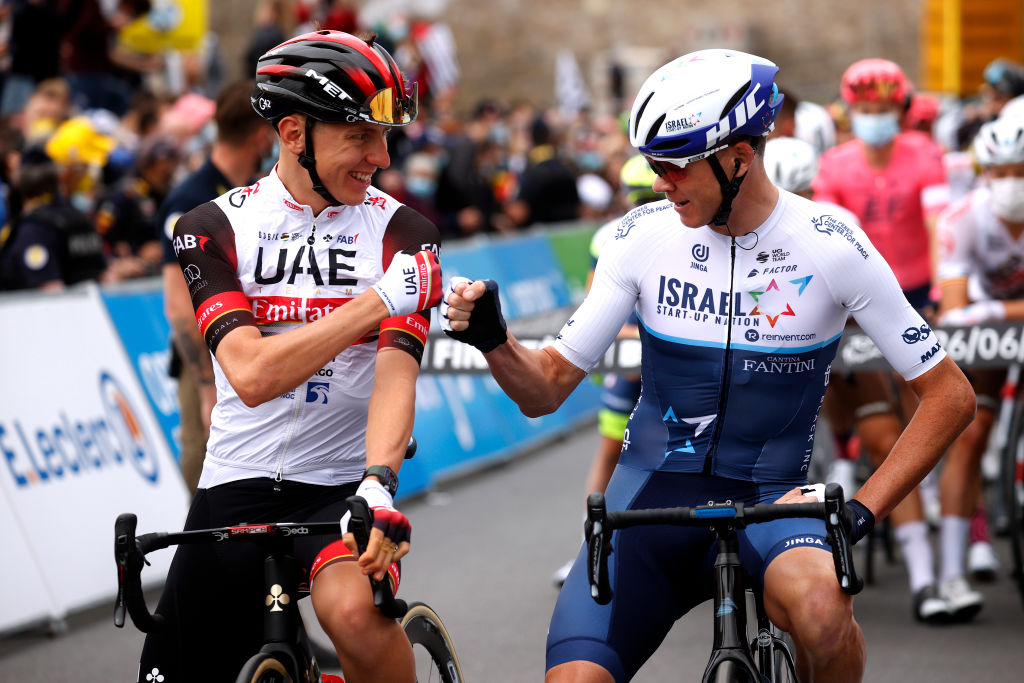Chris Froome says data has made pro cycling more competitive and more dangerous
'It's the only sport where someone tells you there’s danger up ahead and the pace lifts'

Chris Froome believes the depth and breadth of data in professional cycling has raised the bar in terms of the overall standard of performance but also made the sport more dangerous.
The four-time Tour de France winner started his career back in 2008 and is now in his 15th season as a professional. In that time, he says the sport has changed beyond recognition.
"Across the board we’ve seen a huge raise of the bar in terms of the general level of performance in professional cycling," Froome said in a sponsor video for Quad Lock.
The main driver of that change has been, according to Froome, the rise of power meters, which measure the force being pushed through the pedals and can help riders judge their efforts. Whereas riders in the past may have raced or trained on feel, Froome noted that performances are now more dictated by numbers.
Chris Froome questions whether time trial bikes and gravel belong in road cycling
Matteo Trentin: Gravel sectors have no place in stage racing or even Paris-Tours
Tom Pidcock says 'we need to think how we can train in a safer way' following Egan Bernal's crash
Froome's training for 2022 halted by knee injury
Froome himself was known in his pomp for carefully measuring his efforts and not being afraid to drop briefly rather than risk going into the red, but he claimed that even in the last few years, the advances in power and other performance-related data have changed the game for professional cyclists generally.
"There are quite a few different technologies that have played a massive part in shaping the sport in this last 10 to 15 years. First and foremost, the amount of data available through power meters and the collection and correlation of all that data means that performances now are lot more guided," Froome said.
"In the past, power meters been a round for a while but no one really understood how to train with them or what the data really meant. Now we've just got so much data, from the guys who are winning the biggest races in the world, and that data helps forms the basis of all the training plans and all the preparations that lead to racing.
Get The Leadout Newsletter
The latest race content, interviews, features, reviews and expert buying guides, direct to your inbox!
“Everyone has structured training now. Very seldom do you come across someone who just gets on their bike and rides. Everyone’s got a plan, a coach, a structure to follow, which has been a big change compared to 15 years a go.”
Dangers
As well as making the sport more competitive, Froome also pointed out a drawback to the datafication of professional cycling. Having recently held forth on safety issues relating to time trial bikes and gravel roads, the 36-year-old suggested that new technology is making the sport more dangerous.
Froome referred chiefly to modern mapping technology in making the point that every rider knows exactly what to expect from the route of any given race. Directors can study race roads in minute detail, and they feed that information to the riders in real time.
"We’ve just got this abundance of data coming through to us about conditions for the road coming up, so everyone knows what to expect and you get this huge fight for position," Froome said.
"It’s mental. Someone says to you, ‘right guys, you’re going through this really narrow dangerous little village coming up, the road’s really tiny and there’s small bridge with a corner straight after’, and we actually go faster, because you want to be the ones to get there first. If you’re at the back, you’re going to be stuck in this backlog trying to get through the pinch point. It’s probably the only sport where someone tells you there’s danger up ahead and the pace lifts. It’s mental.
“I think racing has, as a result of that, become more dangerous. Through having more data it’s basically made the race more dangerous. Previously we wouldn’t have known necessarily that each pinch point was there and there wouldn’t have been this massive scurry for position. We’d have just got there and all been more relaxed and got through it with no issues. But that’s changed quite a bit.”
Froome has yet to race in 2022 after suffering a knee injury over the winter, but is back in full training and expecting to make his season debut this month.
Cyclingnews is the world's leader in English-language coverage of professional cycling. Started in 1995 by University of Newcastle professor Bill Mitchell, the site was one of the first to provide breaking news and results over the internet in English. The site was purchased by Knapp Communications in 1999, and owner Gerard Knapp built it into the definitive voice of pro cycling. Since then, major publishing house Future PLC has owned the site and expanded it to include top features, news, results, photos and tech reporting. The site continues to be the most comprehensive and authoritative English voice in professional cycling.